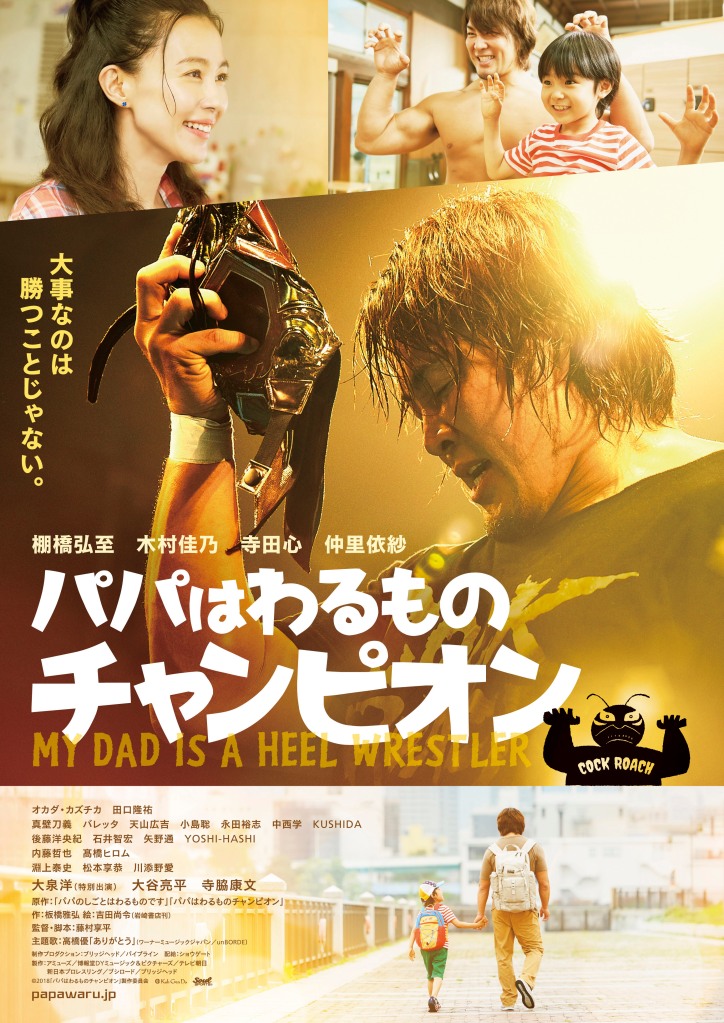
“Your job embarrasses me” little Shota (Kokoro Terada) coldly tells his actually quite lovely father, slowly closing the door on his well meaning attempt at connection. Self evident from the title, My Dad is a Heel Wrestler (パパはわるものチャンピオン, Papa wa Warumono Champion), Shota’s dad Takashi (real life wrestler Hiroshi Tanahashi) is a former champ reduced to playing the “heel”, a masked villain fans love to hate whose signature move is comic relief. Like all little boys, Shota really looked up to his father and wanted to be just like him, and so he gets a dose of paternal disappointment a little earlier than expected in realising that he is in a sense a professional loser with a degree of internalised shame regarding his failure to get back in the ring under his own identity.
10 years previously, just before 9-year-old Shota was born, Takashi was a champion but a knee injury cost him his career. To stay in the game and provide for his family, he decided to become a heel as a temporary measure until he was well enough to return to being a “face”. A decade later however he’s still “Cockroach Mask” working with “Bluebottle” as a comedy villain known for pulling all sorts of unscrupulous tricks like using “Roach Spray” on his opponents or extracting gadgets from a Doraemon-esque interdimensional portal in the shape of a garbage can. Ashamed of himself, Takashi has avoided telling Shota what exactly it is he does for a living, promising that he’ll explain everything when he’s older.
But Shota’s at the age when everyone at school is boasting about their dads and it’s niggling at him that he doesn’t really know, especially when one of his friends jumps to the conclusion he must be a yakuza. Determined to find out, Shota does some detective work and secretly follows him, only to wind up surrounded by beefy guys backstage at the ring. Bumping into a wrestling obsessive classmate (Maharu Nemoto) there with her father (Yasushi Fuchikami), Shota is horrified to realise his dad’s that jerk that everyone hates so when she somehow jumps to the conclusion that his dad’s her idol, reigning champ Dragon George (real life wrestler Kazuchika Okada), he doesn’t bother to correct her.
The irony is, Takashi is a genuinely nice guy. He’s desperate to make it to Shota’s parents’ morning at school, but misses it because he stops on the way to help an old lady who was struggling with her shopping. When the kids are asked to compose a speech about their dreams for the future, Shota says that he wants to get big and strong like his dad in the hope that being big will also make him kind. Shota, however, is still too young to understand the way that wrestling works. He only sees his dad degrade himself, do “bad” things to win, and act in an underhanded, dishonourable way that is completely at odds with his offstage personality. Yet as much as it is that he’s disappointed to think his dad’s a “loser”, the real cause of his resentment is seeing that he’s not being true to himself. Shota’s mother tells him that wrestling is Takashi’s passion, but he pointedly asks her if his dream was being a heel, which it obviously wasn’t.
While Shota picks up on his dad’s internalised sense of shame over the failure to achieve his dreams, he indulges in a little subterfuge himself in keeping up the pretence that his father is not the hated Cockroach Mask but the universally loved Dragon George. Failing to clear up the misunderstanding makes him an unexpected class hero, but it also unbalances the social hierarchy with snooty rich kid and all-round popular boy Yuta irritated at Shota stealing his thunder. When some of his friends start to doubt his story, it’s not the fact that Takashi is Cockroach Mask that upsets them only that Shota lied. Having a pro wrestler dad is cool in itself, he didn’t need to worry about what people would think and he shouldn’t have anyway because he should have stuck by his father rather than rejecting him completely and changing his dream to boring salaryman like the odious Yuta.
Takashi, meanwhile, needs to think through why he’s doing a job that he’s essentially ashamed of. Bluebottle, his partner, who entered the trade as a heel and loves the strange thrill of being booed by the crowd, is offended at his insinuation that being a heel is somehow embarrassing. Michiko (Riisa Naka), an eccentric journalist and wrestling obsessive, tries to explain to Shota that the heel is an essential part of the game – you can’t have a fight without a villain after all, but Takashi still wants to be the face and regain his rightful place as a champion. He can’t let go of past glory and struggles to accept that there are new ways to win. “Wrestling’s not about winning or losing, it’s a way of life” an exasperated Michiko tells her editor (Yo Oizumi), trying to get him interested in the soap opera drama by way of investment in Takashi’s struggle. You don’t have to win, all you have to do is keep getting back up and make sure you put on a good show. Shota figures out that just because his dad’s a “bad guy” doesn’t make him a bad person, while Takashi figures out the only way to be the champ is to embrace his inner roach. Turns out, what wrestling’s all about is authenticity, just not quite in the way you were expecting it.
Screened as part of the Japan Foundation Touring Film Programme 2020.
Hong Kong release trailer (English/Traditional Chinese subtitles)
